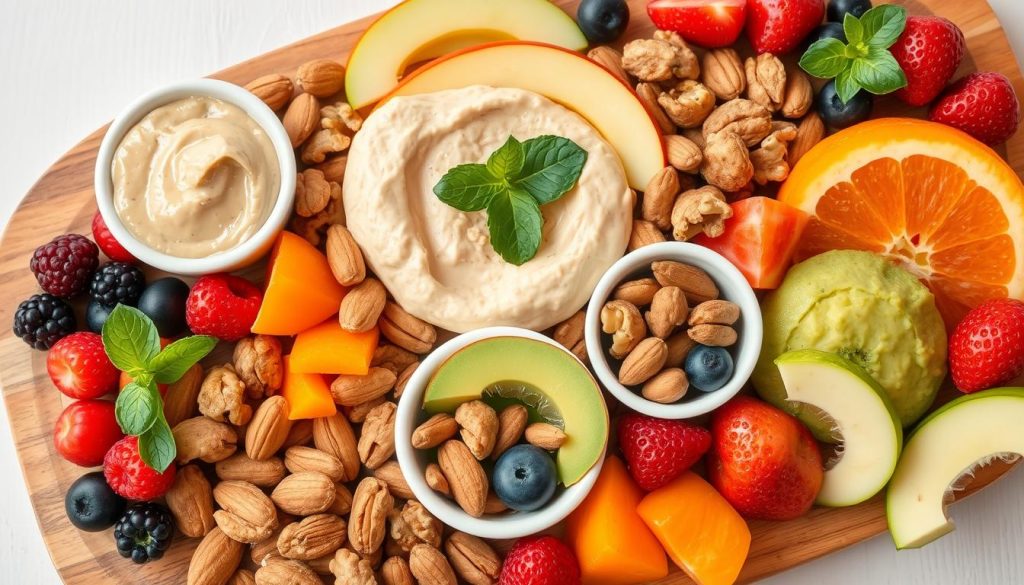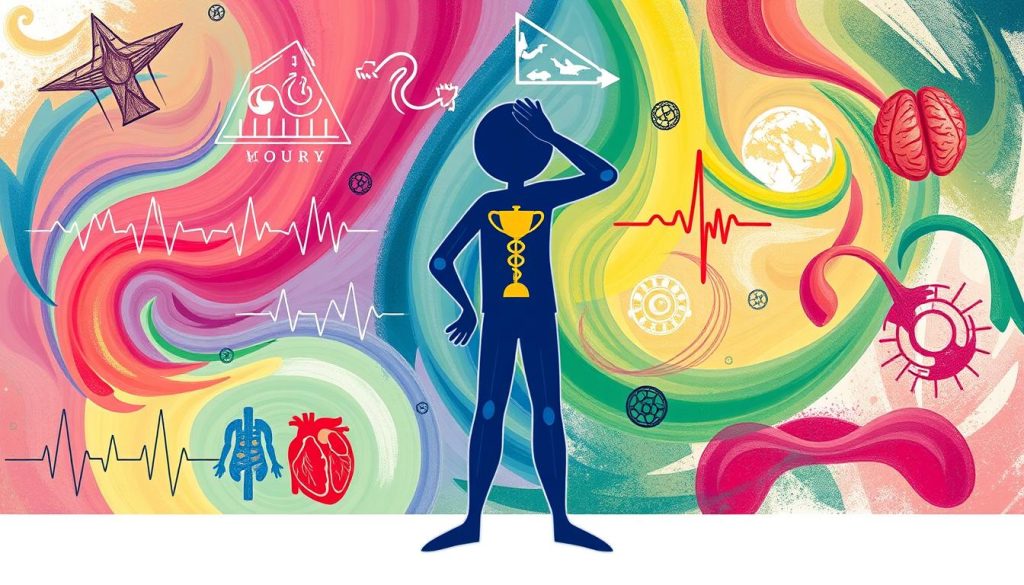As we get older, our energy might seem to drop. But, it’s not a must-have sign of aging. This article will share ways to keep your energy up after 40. We’ll talk about food, exercise, sleep, and lifestyle changes.
We’ll also clear up myths about aging and energy. Plus, get tips from experts on staying lively and full of energy in your 40s and beyond.

Key Takeaways
- Aging doesn’t automatically mean lower energy levels.
- Whole, unprocessed foods can boost energy with essential nutrients.
- Vitamin D and B12 are crucial for energy and can be supplemented if deficient.
- Regular movement and exercise throughout the day can prevent energy dips.
- Proper sleep, stress management, and hydration are essential for sustained energy.
Understanding Age-Related Energy Changes
As we age, our bodies change in ways that affect our energy. Aging naturally leads to changes in metabolism, hormones, and muscle loss. These changes lower our energy and vitality. Our cells’ energy-making ability, or mitochondrial function, also decreases with age.
Common Causes of Energy Decline After 40
Energy levels can drop with age, but these changes aren’t set in stone. Key factors behind this decline include:
- Hormonal imbalances, like lower testosterone, estrogen, and thyroid hormones
- Less muscle mass and strength, or sarcopenia, which affects physical performance
- A slower metabolism, making it harder to keep a healthy weight and energy
- Less efficient mitochondria, which makes it harder to turn food into energy
Why Age Affects Energy Metabolism
The aging process impacts our energy metabolism. Our body’s energy-making ability slows down with age, leading to lower energy. This is due to less muscle and a slower metabolism. Factors like less activity, hormonal changes, and body composition shifts play a role.
Debunking Myths About Aging and Energy
Age-related energy changes aren’t fixed. Many beliefs about aging and energy decline are myths. For example, losing energy with age isn’t a must. The right lifestyle can help keep energy levels high even in later years.
“Aging doesn’t automatically mean less vibrancy and vigor. By understanding the underlying causes of energy decline and taking proactive steps, we can combat the effects of time and preserve our youthful energy.”
Essential Nutrients to Boost Your Daily Energy
As we age, our bodies change, affecting our energy. Luckily, some key nutrients can help keep our energy up all day. Let’s look at the important roles of these vitamins and minerals.
The Role of Vitamin D and B12
Vitamin D comes from sunlight, but our skin makes less of it as we age. This can cause muscle fatigue and lower physical performance. Vitamin B12, found in animal products and some foods, is vital for energy. Adults over 50 often lack B12, leading to tiredness and low energy.
Magnesium: The Energy Mineral
Magnesium is key for over 300 body functions, including making energy. Not having enough can make our hearts work harder and need more oxygen. Foods rich in magnesium include nuts, whole grains, and fish.
Best Food Sources for Energy-Boosting Nutrients
- Fatty fish like salmon, mackerel, and tuna for vitamin D
- Eggs, dairy, and fortified cereals for vitamin B12
- Almonds, spinach, and avocados for magnesium
- Lentils, quinoa, and dark leafy greens for a nutrient-rich boost
Eating these nutrient-rich foods daily can help your body make more energy. It also fights mineral deficiencies that make us tired. If food alone doesn’t help, dietary supplements might be good for some people.
“Proper nutrition is essential for maintaining energy levels as we age. Focusing on vitamins, minerals, and other key nutrients can help combat the natural decline in energy metabolism.”
Keep Your Energy Levels High After 40
As we get older, it’s harder to keep our energy up. But, with the right lifestyle and habits, you can fight fatigue and stay full of life. Here are some key tips to help you stay energized:
- Fuel Your Body with Nutrient-Dense Foods: Eat whole, unprocessed foods like fruits, veggies, whole grains, lean proteins, and healthy fats. These foods give you lasting energy and help your health.
- Stay Hydrated: Not drinking enough water can make you tired and affect your focus. Try to drink six to eight cups of water a day, as the NHS suggests.
- Manage Stress: Stress can make you feel tired. Try activities like meditation, yoga, or deep breathing to keep your energy up.
- Prioritize Quality Sleep: Sleep for 7-9 hours each night to recharge. Have a bedtime routine and avoid screens before bed.
- Get Regular Exercise: Regular activity, like walking, swimming, or cycling, boosts energy and health.
Keeping your energy up after 40 is about more than just one thing. It’s about making healthy lifestyle choices, managing your energy, and taking care of yourself. By following these tips, you can stay full of life and thrive as you age.
| Condition | Symptoms | Potential Impact on Energy Levels |
|---|---|---|
| Heart Conditions (e.g., heart failure) | Shortness of breath, fatigue, swelling in legs | Decreased oxygen and nutrient delivery to cells, leading to fatigue |
| Diabetes | Increased thirst, frequent urination, blurred vision | Imbalanced blood sugar levels can contribute to energy crashes |
| Sleep Apnea | Loud snoring, pauses in breathing during sleep | Disrupted sleep patterns leading to daytime drowsiness |
| Hypothyroidism | Weight gain, constipation, dry skin, fatigue | Slowed metabolism can result in decreased energy levels |
| Anemia | Fatigue, shortness of breath, dizziness, pale skin | Reduced oxygen delivery to cells, contributing to tiredness |
If you’re always tired or have other symptoms, see your doctor. They can find and treat any health issues that might be making you tired.
“Taking care of your body, mind, and overall well-being is the key to maintaining high energy levels and vitality, even as you age. With the right approach, you can unlock your full potential and enjoy a vibrant, energetic life.”
Smart Eating Habits for Sustained Energy
As we get older, our energy levels can change. But, smart eating habits can keep your energy steady all day. It’s important to time your meals and snacks right to avoid energy drops and keep blood sugar balanced.
Timing Your Meals for Optimal Energy
Starting your day with a balanced breakfast is key. Choose whole grains like oats or whole-wheat toast for slow energy release. Add protein, like eggs or Greek yogurt, to keep your blood sugar stable.
Eat every 3-4 hours to keep your energy up. This matches your body’s natural rhythm and helps control blood sugar, especially as you age.
Power Snacks That Prevent Energy Crashes
Right snacks can boost your energy. Studies show snacks high in fiber, protein, and healthy fats improve blood sugar, reduce hunger, and lower belly fat, common issues for women over 40. Good snack choices include:
- Peanut butter on whole-wheat crackers
- Yogurt with berries and nuts
- Hummus with carrot or cucumber sticks
- Apple slices with almond butter
Hydration’s Impact on Energy Levels
Drinking enough water is vital for energy. Even a little dehydration can make you tired. Drink water all day and try herbal teas or infused waters for extra nutrients.
By following these smart eating tips, you can keep your energy high and steady. This lets you face your days with more energy and enthusiasm.

“Consuming snacks that support balanced blood sugar can ease symptoms like fatigue, irritability, and brain fog that may be connected to blood sugar imbalances.”
Exercise Strategies to Combat Fatigue
Keeping up with physical activity is key to staying energetic as you age. Studies reveal that active people are 39% less likely to feel tired and low on energy than inactive ones.
A simple 10-minute walk can give you a quick energy boost that lasts up to 2 hours. Try to do at least 150 minutes of moderate exercise each week. Break it down into shorter sessions to fit your busy schedule. This not only boosts your energy but also strengthens your heart and stamina over time.
After 40, it’s crucial to do strength training to keep your muscles and metabolism strong. Research shows that strength training can even outdo cardio exercises in boosting energy levels.
- A quick 1-2 minute movement break can provide an energy boost throughout the day.
- Jogging for 30 minutes a day can help reduce fatigue, improve concentration, and enhance cognitive functions.
- Swimming is a low-impact exercise that enhances strength, flexibility, and endurance while also increasing blood circulation.
- Performing just 2 minutes of squats during the workday can increase energy levels and improve alertness.
It’s important to find workout routines that you enjoy and fit into your fitness after 40 lifestyle. Try different activities to see what boosts your energy and fights off fatigue.
“Regular physical activity is one of the most effective ways to increase energy levels and combat fatigue, especially as you get older.”
Sleep Optimization Techniques for Better Energy
Quality sleep is key to keeping your energy up after 40. A good bedtime routine and focusing on sleep quality can help. This way, you wake up feeling refreshed and full of energy.
Creating an Effective Bedtime Routine
It’s important to have a regular sleep schedule. Try to go to bed and wake up at the same time every day. Stay away from screens for at least an hour before bed to avoid disrupting your sleep.
Start a calming bedtime routine with activities like stretching, meditation, or reading. Keep your bedroom cool, dark, and quiet. This helps improve your sleep hygiene and makes it easier to fall asleep.
Managing Sleep Quality Over Quantity
While 7-9 hours of sleep is recommended, quality is just as crucial. Avoid caffeine, nicotine, and alcohol close to bedtime. These can harm your sleep quality and mess with your circadian rhythm.
If you can’t sleep after 20 minutes, get up and do something relaxing in low light. This breaks the association of your bed with being awake. Try natural sleep aids like melatonin or herbal teas to help with sleep disorders.

“Approximately one-third of our lives is spent sleeping, making it one of the most important factors in maintaining energy levels and overall health.”
By focusing on sleep hygiene and quality, you can enjoy the benefits of good rest. This leads to more energy throughout your day.
Managing Stress to Preserve Energy
Chronic stress can really drain our energy, making us feel tired and worn out. To keep our energy up after 40, we need to find ways to reduce stress. Meditation is a great tool, as it lowers cortisol and helps us relax. Deep breathing exercises also calm the mind and release body tension.
Regular exercise is another key to managing stress and boosting energy. It burns off stress hormones and releases happy chemicals called endorphins. Enjoying hobbies and leisure activities can also help us unwind and recharge.
Unexpressed anger can be very draining. It’s important to find healthy ways to deal with our emotions. Journaling, talking to a friend, or seeing a counselor can help.
Keeping a healthy work-life balance is crucial for energy preservation. Set limits, learn to say no, and make time for self-care. Getting enough sleep, eating well, and taking breaks are all important for managing stress and keeping your energy up.
“Stress is like a giant with two heads. It can sap your energy and undermine your mental health, but with the right tools, you can tame it and reclaim your zest for life.”
By taking a holistic approach to stress management, we can protect our energy and thrive. Remember, taking care of your well-being is the key to a vibrant, fulfilling life after 40.
Medical Conditions That May Affect Energy Levels
As we get older, some health issues can make us feel tired all the time. It’s key to know about these problems and talk to a doctor if you’re always feeling exhausted.
Thyroid Dysfunction and Anemia
Thyroid problems and anemia are big reasons for feeling tired in midlife. An underactive thyroid makes you feel slow, while anemia from iron lack makes you weak. Blood tests can find these issues, and treatment can help.
Hormonal Imbalances
Changes in hormones, like less testosterone in men or estrogen in women during menopause, can also make you feel tired. Getting help from your doctor can help you feel more energetic again.
Chronic Fatigue Syndrome
Chronic fatigue syndrome (CFS) is a serious condition that makes you extremely tired, even after resting. If you’re tired for more than two weeks and have other symptoms like headaches or memory problems, see a doctor.
While these health issues can affect your energy, the good news is they can often be treated. Regular visits to your doctor can help find and fix the problems. This way, you can get back to living your best life.

“Fatigue is the most common symptom of an underlying medical condition. Paying attention to changes in your energy levels and speaking with your doctor can make a big difference.”
Lifestyle Habits That Drain Energy
As we get older, some habits can really affect our energy. Drinking too much caffeine or alcohol and eating sugary snacks can make us tired. Not moving enough and using too much tech before bed also drains our energy.
Not eating, especially skipping breakfast, is another big energy zapper. It can make us feel really tired later in the day. Changing these habits can really help us feel more energetic and healthy.
Identify and Manage Energy Drainers
- Limit caffeine and alcohol intake, especially in the afternoon and evening.
- Avoid relying on sugary snacks for quick energy boosts, as they can lead to crashes later on.
- Break up periods of inactivity with regular movement and light exercise throughout the day.
- Prioritize a good night’s sleep and limit screen time before bedtime to support your body’s natural energy rhythms.
- Ensure you’re eating regular, balanced meals, including a nourishing breakfast, to maintain stable energy levels.
By changing our habits, we can fight fatigue and stay energetic. This is especially important as we age.
| Lifestyle Habit | Impact on Energy | Recommended Changes |
|---|---|---|
| Excessive caffeine or alcohol consumption | Can lead to energy crashes and disrupted sleep patterns | Limit caffeine to the morning and alcohol to occasional, moderate intake |
| Reliance on sugary snacks | Provides a temporary energy boost followed by an inevitable crash | Choose nutrient-dense, complex carbohydrates and healthy fats for sustained energy |
| Prolonged periods of inactivity | Contributes to fatigue and muscle weakness | Incorporate regular movement and light exercise throughout the day |
| Overuse of technology before bedtime | Disrupts the body’s natural sleep-wake cycle, leading to poor sleep quality | Establish a relaxing bedtime routine and limit screen time in the hours leading up to sleep |
| Skipping meals, especially breakfast | Can cause energy crashes and blood sugar fluctuations | Ensure you’re eating regular, balanced meals, including a nourishing breakfast, to maintain stable energy levels |
By changing our habits, we can fight fatigue and stay energetic. This is especially important as we age.
Conclusion
Keeping your energy up after 40 is possible with a whole-life approach. Eating right, exercising, sleeping well, and managing stress are key. Also, fixing any health issues is important for staying energetic.
Start making small changes to improve your life. Adjusting your meal times, eating snacks, and getting better sleep can really help. Remember, finding what works for you takes time and trying new things.
Focus on managing your energy, aging healthily, and living well. This way, you can reach your full potential and stay energetic in your 40s and beyond. Take charge of your energy and live the vibrant life you want.
FAQ
What are the common causes of energy decline after 40?
Energy decline after 40 can be due to hormonal changes and less muscle mass. It also happens because of a slower metabolism and less efficient energy production in cells.
How can essential nutrients help boost energy levels?
Nutrients like vitamin D, B12, and magnesium are key for energy. Vitamin D comes from sunlight, B12 from animal products and some foods, and magnesium helps in many body functions, including energy.
What lifestyle strategies can help maintain high energy levels?
To keep energy up after 40, eat well, drink plenty of water, and exercise regularly. Manage stress and sleep well. Also, check your medications and health conditions.
How can smart eating habits contribute to sustained energy?
Eating regular meals, especially breakfast, keeps blood sugar and energy stable. Whole grains give slow energy, while sugary foods cause crashes. Power snacks with protein, fats, and fiber help between meals.
What are the benefits of regular exercise for energy levels?
Exercise, like brisk walking, boosts energy and stamina. It also improves heart health. After 40, strength training helps keep muscles and metabolism strong.
How can sleep optimization support energy levels?
Good sleep is vital for energy. A consistent bedtime routine and avoiding screens before bed help. So does managing room temperature and noise for better sleep and energy.
What medical conditions can affect energy levels?
Fatigue can signal issues like thyroid problems, anemia, low testosterone, or chronic fatigue syndrome. Regular health checks can spot these early.
What lifestyle habits can drain energy levels?
Habits like too much caffeine or alcohol, sugary snacks, not moving enough, too much tech use, and skipping meals, especially breakfast, can lower energy.
